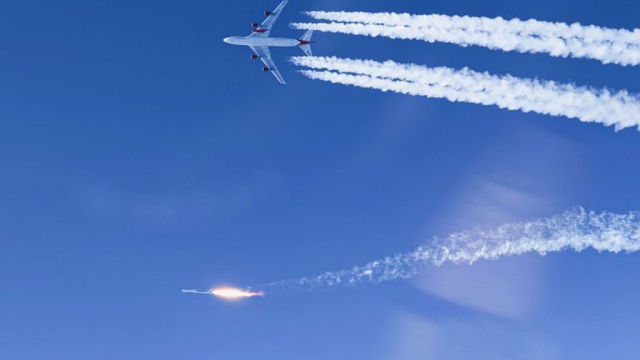Billionaire Branson launched 10 satellites from a plane
Billionaire Richard Branson finally managed to launch a rocket with 10 satellites from the Boeing 747. His company expects to occupy a niche of such launches and reduce the cost of putting small satellites into orbit.
American billionaire Richard Branson on the second attempt managed to carry out a space launch, to which he went for ten years. The day before in California, his LauncherOne rocket successfully launched in the air from under the wing of a Boeing 747 passenger plane specially equipped for air launch purposes, which is called Cosmic Girl. The plane took off from an airfield in California and launched a rocket while over the Pacific Ocean.
An hour after the launch, Virgin Orbit confirmed the success of the operation. "A new gateway to space has opened," said Dan Hart, chief executive of Virgin Orbit. "Today, our efforts have been rewarded with a remarkably accomplished mission and we couldn't be happier."
"Virgin Orbit has accomplished something that many thought was impossible," said Richard Branson, founder of the Virgin Group. "This amazing flight is the culmination of many years of work that will inspire a whole generation of innovators on the way to space."
For the first time Virgin Galactic has announced plans for implementation of air space launches in July 2012. Initially, it was planned to use the WhiteKnightTwo rocket plane as a carrier, but later the choice fell on a specially converted Boeing 747. The customer for the first successful mission was NASA - under a contract signed back in 2015,
All of them are launched for various research purposes and to demonstrate new technologies. Despite this, Virgin Orbit stressed that the main goal of the first launch is to test the system's performance. "It is important to note that this is a test run. Any first launches of launch systems carry a certain risk, " Hart said.
Virgin Orbit did not disclose plans for future launches, but Hart confirmed that the next rocket is already being assembled and will be ready in a few weeks. According to him, currently, customers in the field of US national security are interested in launching mini-satellites using air launch.
The first attempt to launch a space rocket using an airplane from Virgin Orbit ended in failure in May 2020 - due to a technical malfunction, the rocket could not launch and enter low-Earth orbit.
Virgin Orbit is not the first company to launch payloads into space using an air launch. Launches of Pegasus rockets with the help of aircraft since the beginning of the 1990s were carried out by the company Orbital Sciences Corporation. However, in 30 years, the company has carried out only 44 such launches.
"When I started researching the feasibility of launches and thinking about whether we should do it, Pegasus was like a flickering neon sign for us," said Will Pomerantz, vice president of special Projects at Virgin Orbit, before the first, unsuccessful launch. But from the point of view of market prospects is probably no."
In his opinion, Pegasus rockets did not attract a large number of customers, because 30 years ago they simply did not exist, and the industry of commercial miniature satellites began to develop in an explosive way only a few years ago.
Pegasus rockets are still being launched today, but the cost of their launches has literally soared over three decades. If in the 1990s NASA paid $16 million for the launch, in recent years it has approached $60 million, which is comparable to the cost of Elon Musk's Falcon 9 rockets. If the proposed launch scheme pays off, Virgin Orbit intends to send satellites weighing up to 300 kg into orbit at a cost of $12 million.
Nikolai Gorodetsky

